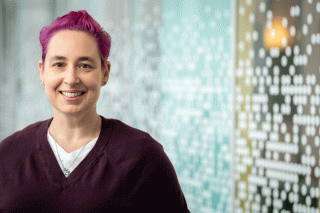“I don’t let any line of code be mysterious,” says Laney Strange ’02, Associate Teaching Professor at Northeastern University.
She learned this direct approach to coding as a computer science (CS) student at Simmons. “Some people like to make coding seem harder than it is. Professor Nanette Veilleux likes to make it seem easier than it is.”
Strange heaps praise on Professor Veilleux, Professor Margaret Menzin, and Professor Emeritus David Browder. “They would say, ‘Look, there’s going to be syntax we have to get used to, but we’ll break it down, and it will be no big deal.’ They made the tech fields less intimidating. I try to emulate that while I teach.”
Evidently, the approach has worked for her: Strange is the winner of the 2021 University Excellence in Teaching Award at Northeastern University. “I tell my students that it’s OK to make mistakes, ask questions, get it wrong. Everyone can do it — everyone has a place in CS. Everything we do, I break it all the way down. That makes it less intimidating and more accessible. I think students appreciate that.”
Strange entered the undergraduate program as an adult student — in her twenties and married. “I felt out of place at first, but I made friends with students who accepted me anyway,” she says. “We had a study group at my friend Krystal’s dorm — I wasn't one of them, exactly, but they were so welcoming. It made me feel like I was in the right place. I’ve tried to make other people feel welcome by behaving the same way that my Simmons friends did.”
There’s no perfect time to do something. If you want to do something, you might as well just go and do it now.
The atmosphere of a women-centered college also helped to build her confidence. “My peers were supportive and non-competitive,” she says. “All of the leadership positions were held by women, and a lot of my professors were women. Seeing that in action was really helpful. Representation matters.”
The confidence she gained was especially vital, given the state of the tech field. “Entering a male-dominated culture wasn’t as bad as it could have been. I’ve had the same experiences a lot of women and non-binary individuals have — women in CS are in a broken system. Instead of trying to fix the system, I had confidence in my abilities and was able to navigate it just the way it was. That was really valuable.”
When she graduated from Simmons, Strange hadn’t intended on pursuing a teaching career. “It was the early 2000s when I finished my bachelor’s,” she says, “back then, a BS in computer science didn’t create the opportunities that it does today.” Uninterested in the coding jobs she was qualified for, Strange ended up at graduate school, then went back to work in the industry, including a job at Amazon.
“I learned a lot from being in the industry,” she says. “In a classroom environment, you can get away with imperfect code. In the industry, you can’t. At Amazon, everything has to scale to a billion times — if it’s slightly inefficient, it will take 5 seconds, and people won’t wait 5 seconds!”
Eventually, she joined a friend’s startup. “I got a teaching job on the side. The startup fizzled, but the teaching gig was great! Ever since then, I wanted that as my job.”
Reflecting on her life and career path, she believes in seizing opportunities as they arise. “There’s no perfect time to do something. If you want to do something, you might as well just go and do it now. I went to college as an adult — maybe that wasn’t the perfect time to go, but I went when I wanted to go. If I had waited for a better one, maybe I never would have done it.”

